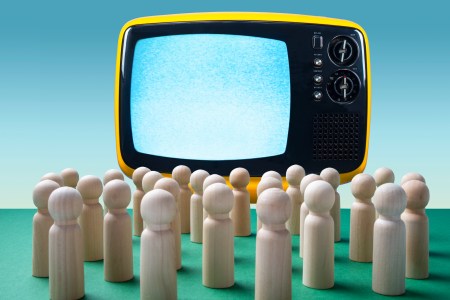The Pulitzer Prize-winning novelist and playwright Thornton Wilder once said, “There’s nothing like eavesdropping to show you that the world outside your head is different from the world inside your head.”
It’s a good quote, but reads as slightly off-kilter at the same time. Eavesdropping? A good thing? The device of Shakespeare’s most brilliant tricksters? The thing that parents and teachers make sure you know is off limits from the minute that childhood conversations actually start getting interesting?
Yes, that eavesdropping. The very same. It doesn’t get nearly enough credit. Instead of being understood as an uncouth behavior, “overhearing” should be celebrated, welcomed and pursued. It’s an underrated tool in an increasingly lonely and disconnected world.
The Joys of Listening
Everyone has a story. Everyone’s telling stories. They’re there if you want them: in an elevator, on the train, at the coffee shop. The comedian Nick Kroll certainly partakes, saying, “I do a lot of eavesdropping. That’s one of the things I miss about New York: just checking people out.”
He’s onto something. It might seem like a silly thing, but for all the cuisine and art and glitz, one of the true joys of living in a place with a lot of people is simply listening to all of them. Sometimes there’s nothing in the world that you want more than for them to just shut up (e.g., the businessmen cutting sidewalk deals on AirPods, or the couple that talks through the whole movie). But eavesdropping has the capacity to colorize your day. It arms you with a tidbit or anecdote that you can ferry along to your next interaction, or, perhaps, just an impression to chew on within your own brain.
Psychologists have pointed out that eavesdropping enhances one’s “theory of mind.” It’s a psychological concept with close ties to our understanding of empathy. Theory of mind refers to one’s ability or tendency to understand that other people are different, to give them credit for their unique mental states (i.e., you have different wants, dreams, desires, influences and intentions than I do). The more you hone it, the less you’ll pass through the world like a grouch, the less cortisol you’ll release, and the more years you’ll live — or so the relationship between positivity and longevity would suggest.
Could “News Sobriety” Save Your Mental Health?
No notifications, no nothing. It’s a seductive idea, but is it ethical?Context Is Everything
The most beneficial form of eavesdropping appears to be listening in to the conversations or interactions of strangers, people out and about in the world — like NPCs in a video game. In this context, eavesdropping makes you more empathetic in the general sense (less misanthropic, let’s say, at the very least).
But eavesdropping can be used for good in more intimate settings, too. Last summer, The Wall Street Journal wrote an interesting article about the water-cooler eavesdropping that typically goes on in offices, and how it might seem like a harmful thing on the surface (the Big Brother aspect of executives listening in on associates), but it can actually foster a richer understanding of what the company needs to address.
Specifically, what are people worried about? Who’s confiding in whom? How are people representing their company on calls? What’s the mood like around the office? You can learn a lot from these sorts of interactions. Let’s say you’re the boss, and you don’t love what you’re hearing. Instead of holding people accountable on the spot, it can help to process this “data” and work towards making connections and upping morale. If you’re the office neophyte, listening to the ecosystem around you can help you get ahead, or perhaps determine whether this is the right place for you.
That last point is relevant in domestic settings, too. Eavesdropping on loved ones might be the behavior at its trickiest (and least ethical), but it can sometimes be beneficial, especially for children, who are probably going to do it anyway. Everyone was a kid once, sitting on the stairs, trying to hear those late-night kitchen discussions. Accepting that eavesdropping is part of the familial universe — and that if you’re a parent, you can do it sparingly, too (say, listening to how your two kids talk to each other when they’re playing in the backyard) — can make us all kinder and wiser. The information you hear isn’t a transgression in itself. It’s what you choose to do with it.
How to Start Eavesdropping
Perhaps the safest — and easiest — way to reap the rewards of eavesdropping is to pursue it in your immediate outside world. Take your headphones out at the grocery store. Notice what you hear. It’s sometimes hilarious.
I was at Trader Joe’s last week when someone asked his friend, “What would you do if a girl asked you on the second date if you’d cut your hair?” (He had dark hair that fell to his shoulders.) His friend replied, “No, man. I love the flow. Absolutely not.” I silently agreed with guy, then dropped a bag of frozen peas into my cart. Feeling a bit wiser as I went on my way.
Whether you’re looking to get into shape, or just get out of a funk, The Charge has got you covered. Sign up for our new wellness newsletter today.



















